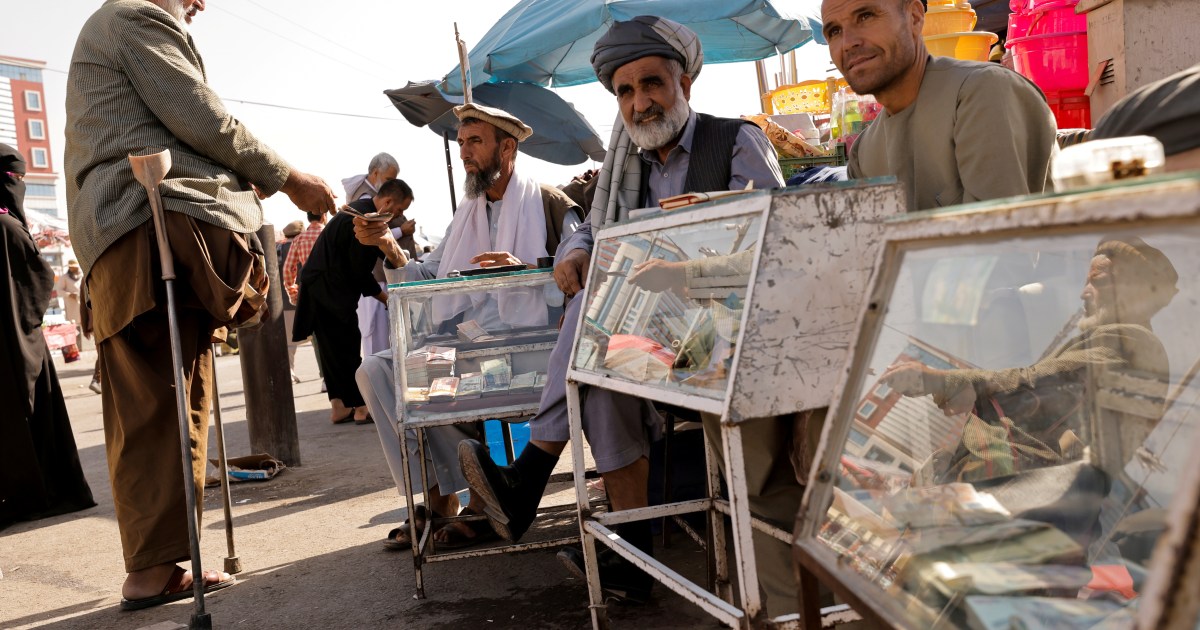The Permanent Representative of the Afghan Interim Government to the United Nations, Muhammad Shaheen, held a meeting in Doha with Western and Arab ambassadors, while sources familiar with secret plans said that international officials were planning to fly funds to those in need while avoiding funding the Taliban government.
Shaheen said - during his meeting with ambassadors of foreign and Arab countries, including the United States of America in Doha - that it has been proven that isolating Afghanistan in the past was a failed policy that did not serve anyone.
He made it clear that no one wants that, and all unfinished reconstruction projects in Afghanistan must begin.
He added that his country is ready to deal with the international community on the basis of mutual interests and resolve issues through talks, understanding and positive interaction.
Transfer money by air
Reuters quoted sources described as well-informed that international officials are secretly planning to fly funds to the needy in Afghanistan, while avoiding funding the Taliban government.
Reuters also quoted its sources as saying that donor countries want to establish a fund for funds to help pay salaries and keep schools and hospitals open.
A senior EU official said that if that country collapses, a heavy price will be paid, and no one wants to rush to recognize the Taliban, but there is a need to deal with it.
Sources told Reuters that urgent funding may be transferred to Kabul for distribution directly to the poor through banks with the approval of the Taliban, but without their participation;
Everyone gets paid less than $200.
According to the World Bank, the departure of foreign forces - which were led by the United States - and many international donors deprived Afghanistan of funding that covered about 75% of public spending.
European Commissioner for Home Affairs Ylva Johansen said that financial support has been allocated to help Afghans in need, both inside and outside Afghanistan.
Johansen emphasized that there is a moral obligation to support the approximately 22,000 Afghans who have been transferred to the European Union, in addition to those who have sought refuge in Afghanistan's neighboring countries.
Receiving 42,000 Afghanis
In this context, the European Union announced Thursday that the request of the United Nations High Commissioner for Refugees for the bloc to receive 42,500 Afghan refugees over a period of 5 years can be fulfilled, although any decision in this regard is up to the member states.
"I think it (receiving refugees) is achievable," Johansen told a high-level forum on ways to provide protection for Afghans at risk, noting that the bloc had a "moral duty" to help whenever possible.
Johansen acknowledged that absorbing this number of refugees would not "solve the Afghan crisis, but it is our moral duty and our task today."
"There are more people who are in need of protection," she said - in a video address to the forum, which included representatives of EU member states, the United Nations High Commissioner for Refugees and the International Organization for Migration.
Johansen took note of the estimates of the United Nations High Commissioner for Refugees, Italian diplomat Filippo Grandi, that about 85,000 Afghan refugees living in neighboring countries will need resettlement in the next five years, and that the European Union should consider accepting half of that number.
But she added that the urgent matter now was to evacuate the most vulnerable people inside Afghanistan, especially women journalists and judges.
Johansen noted that 24 member states of the European Union received up to 22,000 Afghans in the wake of the "chaotic" US military withdrawal and the return of the Taliban regime to power.
She said this sent a "strong message" that the bloc was "ready to step up this pace" to address the needs of Afghans living under threat.
Appointment of a Special Rapporteur on Afghanistan
On the other hand, the United Nations Human Rights Council on Thursday approved the appointment of a special rapporteur on Afghanistan to investigate possible violations committed by the Taliban and other parties to the conflict there.
By adopting the resolution put forward by the European Union, the Council indicated that it would keep the spotlight on Afghanistan, especially with regard to the rights of women and ethnic minorities under Taliban rule.
The draft resolution submitted by the European Union received the approval of 28 countries, while 5 countries opposed it, including China, Pakistan and Russia, and 14 abstained from voting in the 47-member council.
A special rapporteur on Afghanistan will begin work next March, and will be supported by United Nations experts in legal analysis, forensic medicine and women's rights, according to the draft resolution.
The UN High Commissioner for Human Rights, Michelle Bachelet, already has a mandate to monitor the situation in Afghanistan until March under a draft resolution put forward by Pakistan on behalf of the Organization of Islamic Cooperation last August.

